Home » Uncategorized (Page 2)
Category Archives: Uncategorized
Enter the Bill Douglas Cinema Museum…
The University of Exeter is blessed with many unique archival resources that we integrate into our teaching: Victorian periodicals, writers’ papers, collections of historical documents, and over the course of the term I’ll say a bit about them all. Today I am going to spotlight the treasure trove of popular culture history that is the Bill Douglas Cinema Museum, which never ceases to inspire us and our students!
The BDCM contains the sorts of items you would expect in a museum devoted to the cinema: old filmmaking equipment, ephemera (e.g. postcards, cigarette cards, toys) relating to major movie stars such as Charlie Chaplin and Marilyn Monroe, posters and programmes for film showings, original cel artwork from Disney films, fan magazines, and documents that used to belong to filmmakers (the Lumière brothers, for instance).
But the BDCM also covers hundreds of years of the moving image! So it has significant collections of panorama, magic lantern slides, stereoscopes, kaleidoscopes, and peep shows. These are an invaluable resource for students who are reading eighteenth- and nineteenth-century literature: we can see for ourselves the objects and experiences being described by novelists and poets. These materials also provide a rich insight into the history of popular visual culture, running right up to the era of the cinema!
Myself and my colleague Dr Sinéad Moynihan were doing some teaching in the BDCM recently. This was on an MA module called The Literature of Cold War America and the particular topic that week was the blacklist and the anti-communist witch-hunts of mid-century America. We covered a lot of different texts in the seminar, such as the BDCM’s collection of 1950s books and pamphlets that investigated whether or not the film industry really had been infiltrated by communist subversives.
We started by thinking about the African-American performers, writers, and political activists under FBI surveillance during the 1950s. To this end, we looked at the material from the BDCM relating to Paul Robeson, the singer prevented from leaving the country in 1950; later that year he started a political newspaper entitled Freedom. One item in the BDCM collection is the souvenir programme for Robeson’s 1958 UK tour – which he undertook as soon as his passport was restored. The students also read short stories by the writer Alice Childress and thought about their different publication contexts (e.g. how the stories published in Freedom in 1951 compared to their republication in The Baltimore Afro-American in 1956).
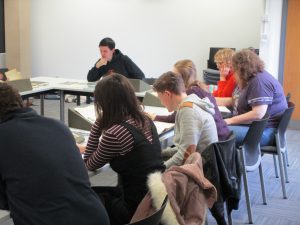
Here are the students looking at film fan magazines, lobby cards, movie posters, and postcards relating to Marlon Brando, star of the 1954 film On the Waterfront. We discussed what Brando’s celebrity and acting style might say about the United States in the 1950s, torn between swaggering confidence and deep-seated anxiety.
The BDCM offers students the opportunity to volunteer and gain experience of working in the museum sector and modules such as British Screens have curatorial activities built into them. You can see the display cases that students have put together as soon as you enter! If you’re visiting Exeter in the coming months, the BDCM is definitely worth checking out, and you can see the student-curated displays for yourself!
Dissertation time!
This week I joined my colleagues Dr Felicity Henderson and Dr Jana Funke for a lecture on ethics and interviewing people. This was aimed at our final-year undergraduates, who are busy researching their dissertations right now. The English dissertation is an 8,000-word extended essay where students shape a distinctive research project in consultation with a member of academic staff. As well as tutorials with their dissertation tutor, students benefit from workshops and a weekly lecture based on sharing tips and advice on how to complete the dissertation. In this week’s lecture we helped the dissertation students think about the following: what ethical issues does your research generate? Are there certain principles by which you should always abide when devising the collection and publication of data? And what is good practice if your dissertation involves interviewing people?
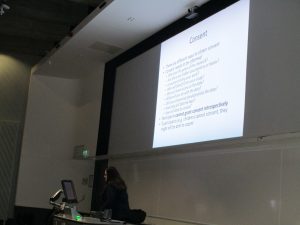
Jana is the ideal person to talk about research ethics, since she is Chair of the College of Humanities Ethics Committee. You can see from her slide that she talked about the importance of getting informed consent from participants in our research.
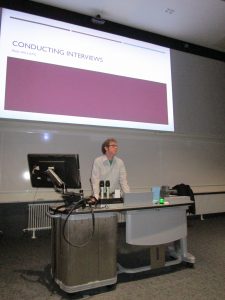
I spoke about how to run interviews: organizing them in advance, learning to be a good listener, and tips on transcribing them afterwards. Based on my own experience I recommend that students avoid interviewing anyone next to a busy road on a windy day in a major city!
So what do the students write about in their dissertations? There is no ‘one-size-fits all’ template for a dissertation; they are as varied as our students’ research interests. To give you an idea, here are some dissertation titles from recent years:
- “Becoming a ‘Conceptual Bastard’: The Relationship Between Visual Culture and the Sexualization of Black Women’s Bodies from Humanism to Posthumanism”
- “‘Beth Redy for to Meete Hym Everemoore’: A Study of Death Personified in Three Medieval Texts”
- “Simile, Difference, and Translation in Christopher Logue’s War Music“
- “Animal Identity, Jungle Ruins and Adapted Environments: Postcolonial Ecocriticism in The Jungle Book(s)“
- Misinterpreting Allegory: Paradise Lost and Its Critics”
- “‘The Stranger Acclimatizes Everyday’: Reconceptualizing Liminality in the Palestinian Context”
- “‘It’s Aggressive But Sometimes You Need to Shout to Get the Point Across’: Grime and ‘Road Rap’ as a Challenge to Postimperial Melancholic Interpretations of the 2011 London Riots”
The dissertation is a challenging endeavour but it gives students the chance to take all the skills and knowledge they have gained over their degree and bring them to bear on a subject that they are passionate about. Within the framework of supervision, workshops, and lectures, they can craft a project that reflects their own interests, and pursuing a self-motivated research project where you have to set yourself targets and deadlines is great experience for whatever you do after your BA degree!
Last but definitely not least, the Department of English & Film at Exeter gives a prize for the undergraduate dissertation that best communicates the qualities of imagination and intellectual flair. Last year this award (the Gamini Salgado Prize) was presented to Rebecca Young for “‘See Her Brain – Go Round’: Emily Dickinson, Neurodiversity and the Matter of the Brain.” Well done Rebecca!
This doesn’t even cover the Creative Writing dissertation – come back later and I’ll tell you all about that too!
Spring Term at Exeter!
Welcome to the Department of English & Film at Exeter!
My name is Dr Paul Williams and I’m a Senior Lecturer in Twentieth-Century Literature – I’m also one of the Admissions Officers in the department. Over the course of the Spring Term I’ll be regularly blogging about activities on campus, the research that staff do, and what keeps our students busy. And I’ll say a bit about all the opportunities we offer at Exeter, academic and otherwise, hence my trip to the sea below!
Right now everything is in full swing: essays are being marked, students are going on trips, and dissertations are being written. This blog will give you a peek inside our lecture theatres, seminar rooms, libraries, and archives. You’ll hear from staff and students alike!
We can’t wait to meet our Offer Holders at one of the Offer-Holder Visit Days in February or March, but if you can’t make it to Exeter in person, hopefully this blog will give you a taste of what life here is like!
A Trip Down the Estuary…
I thought I’d start with one of my favourite things to do, which is walk to the town of Exmouth to see the sea. The South-West Coastal Path gives good access to the coastline all along the Devon coast and the journey from Exeter to Exmouth gives you fantastic views of the Exe estuary. Starting in the centre of Exeter it takes me around 2 hours 30 minutes to walk to Exmouth, but you can cycle down the estuary too, or use the train service (c.25 minutes).
Today encapsulated all the weather you might expect in Devon in January. It was dry and good weather for the bird watchers outside Topsham…
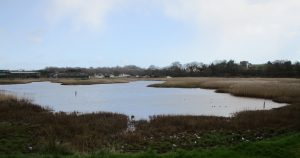
Then the hail started…
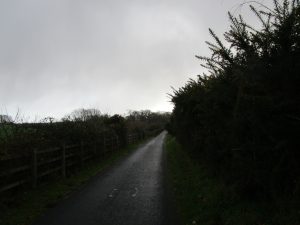 And the wind picked up…
And the wind picked up…
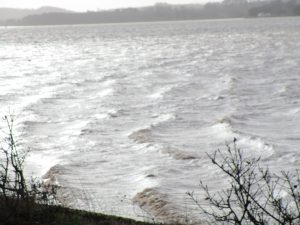 But the sun finally broke through before Exmouth…
But the sun finally broke through before Exmouth…
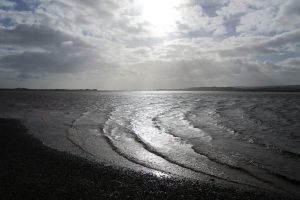 And it was all worth it at the end!
And it was all worth it at the end!
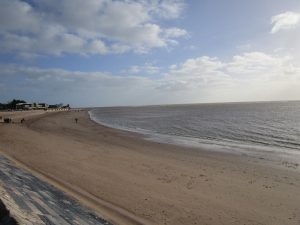
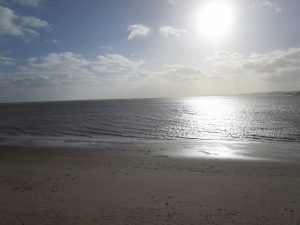
See you back here for more news from English at Exeter!
Spring Term Reflections
Dear reader,
This is Lisa, one of the Admissions Officers in English and Film at Exeter. I’m writing to say hello and welcome to everyone visiting this site for the first time, and welcome back to those returning! I hope you enjoy exploring some of the posts here about student life and what studying with us is like.
We’ve just reached the end of our second teaching term here, so I wanted to take a moment to reflect on some of the great things that have happened this term, and give you a flavour of what a spring semester is like at Exeter.
Dissertation destinations
Many of our final-year students have been working on their dissertations across the term, moving from their early planning stages to writing a complete draft. I’ve worked with students this year on topics ranging from the representation of gender ideals in women’s magazines of the 1950s; a postmodern reading of Nightcrawler; an exploration of gender, the posthuman and facial expression in Ex Machina; and the alcoholic woman in the novels of Jean Rhys. I’ve been hugely impressed this year by the depth and quality of the work and ideas final-year students are producing, and the passion they bring to each tutorial.
Archival adventures with the second years
I’ve worked with many of our second-year students on the module EAF2510 Adaptations, where we’ve been exploring page-to-screen transformations with texts and writers that range from Dickens to Frank Miller. We’ve been in and out of the archives, looking at magic lantern slides as early visual adaptations of ‘A Christmas Carol’ and marketing materials for David O. Selznick’s adaptation of Daphne Du Maurier’s Rebecca (1938 / 1940), and students have been writing their own treatments, pitching big screen adaptations of short stories by writers such as Katherine Mansfield, Edgar Allen Poe and Ernest Hemingway. We ended the module with Throne of Blood – Akira Kurosawa’s spectacular and spectacularly dark transcultural adaptation of Macbeth.
Module choice musings with our first years
I’ve also had a steady stream of first-year personal tutees in and out of my office making their module choice selections for their second year of study. It’s been great to chat with them about the possibilities in front of them, and hear about their developing interest in different areas of study, with some students rapidly falling in love with creative writing, or film, or Renaissance literature. Quite a lot of students are also excited about taking options in other disciplines, which anyone can do through modularity: I’ve been helping these tutees think about which modules might complement their studies in English.
Talking all things film
One of my personal favourite things this term has been the launch of Film Talk, effectively ‘book club’ style event for cinema fans. It’s open to anyone across the university, and is a non-hierarchical space in which students and staff gather to chat about the latest big and small screen releases, led by a student speaker who kicks things off with their personal review. This term we talked about Star Wars: The Last Jedi; Three Billboards Outside of Ebbing Missouri; The Shape of Water; I, Tonya and Annihilation. Mark Kermode even joined us for the launch and gave his views on The Last Jedi! It’s been wonderful to grow this little community of people passionate about movies, and see where the conversation goes at each meeting.
Research matters!
It’s also been a great semester for inspiring new research from our English staff. Dr Joe Crawford’s research on female Romantic poets has shed fascinating new light on the use of opium for its “tranquilising power” and “calming” properties to aid their writing. Dr John Wedgwood Clarke’s poetry, inspired by the works of Cornish author William Golding, were featured as part of a new exhibition at the Siobhan Davies Studies in London by the filmmakers Webb-Ellis. Professor Joe Kember’s research into magic lantern histories has led to the digitization of thousands of fragile images of Devon. Many of our staff presented their work at international conferences, published new books and new articles; whilst our postgraduate students have achieved some fantastic things this term, including the shortlisting of MA Creative Writing student Kim Squirrel for the inaugural Dinesh Allirajah Prize for Short Fiction.
Looking ahead
So now it’s Easter, and many of our students are taking a well-needed break whilst mulling over some of their current and upcoming assessments (term 3 is our assessment period, where many students will be undertaking examinations). We’d like to wish you a Happy Easter: watch this space for further news about what we and our students are up to!
We Are Researchers
Staff regularly give Wednesday lunchtime seminars on their latest research. Here are some photos of Chris Ewers and Debra Ramsay talking about “War and Sport in Media”:
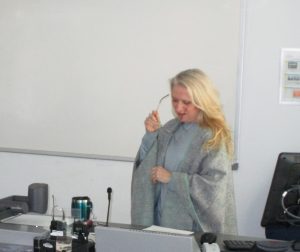
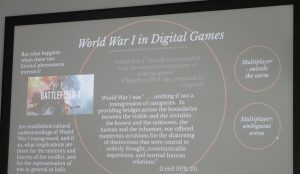
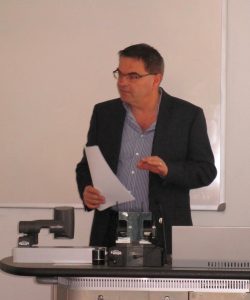
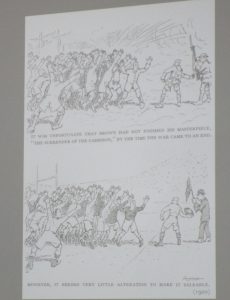
We Are Students
Last weekend the English Society went to Budapest. Look who they ran into outside Starbucks!
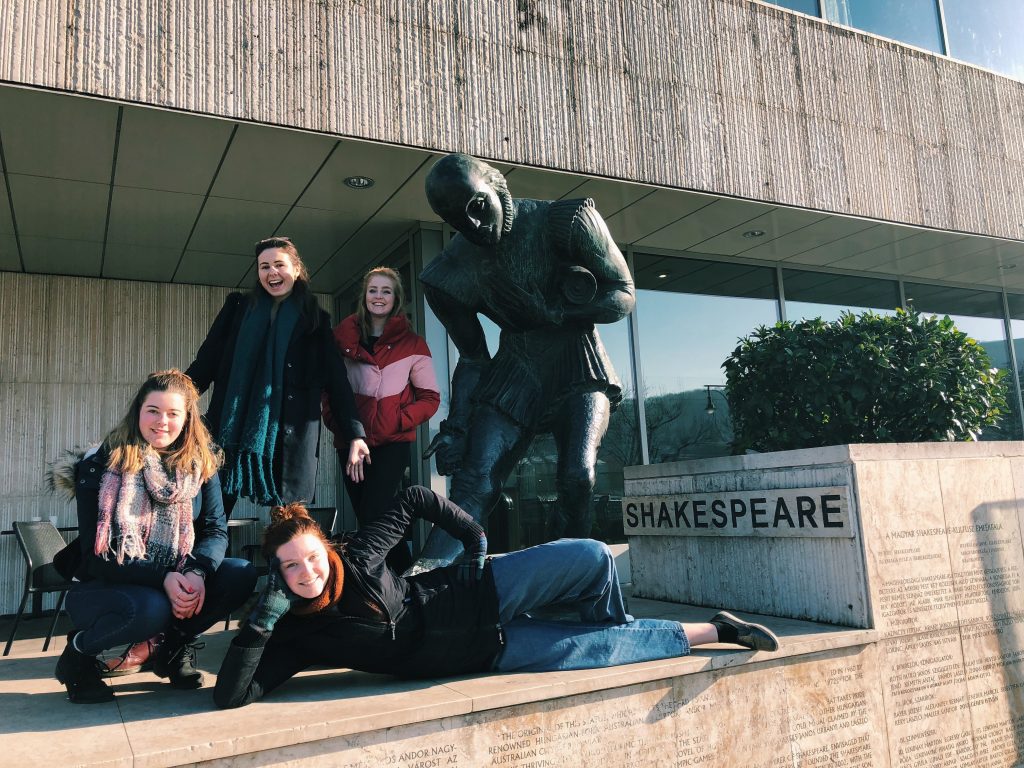
Can’t help gravitating towards the books. They must have been making a start on the reading for second-year module Crossing the Water: Transatlantic Literary Relations.
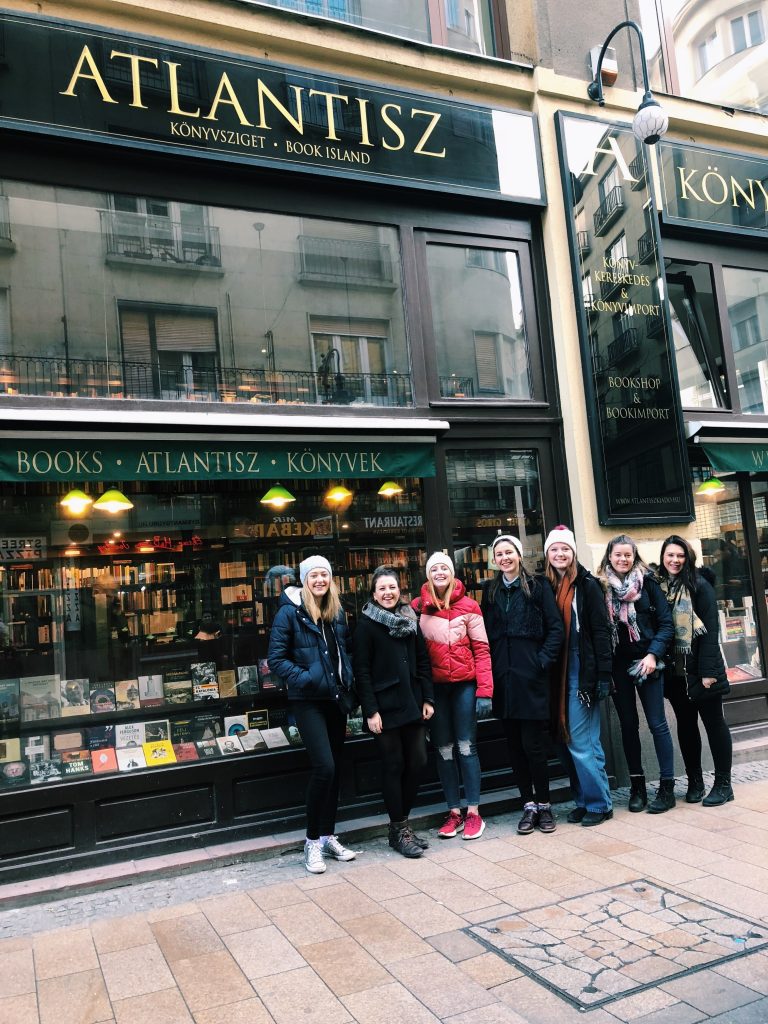
Photos courtesy of Loren Smith, 2nd Year BA English